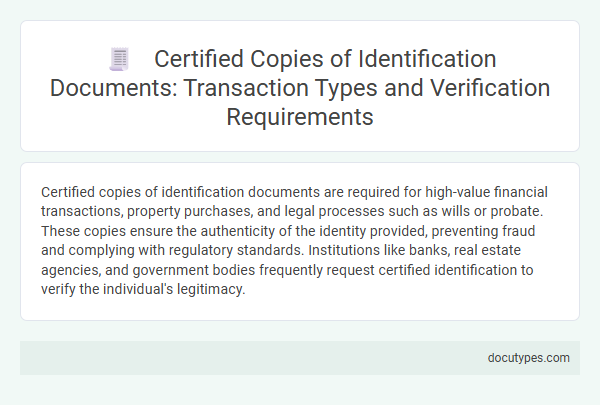Certified copies of identification documents are required for high-value financial transactions, property purchases, and legal processes such as wills or probate. These copies ensure the authenticity of the identity provided, preventing fraud and complying with regulatory standards. Institutions like banks, real estate agencies, and government bodies frequently request certified identification to verify the individual's legitimacy.
Introduction to Certified Copies of Identification Documents
Certified copies of identification documents serve as verified duplicates of original IDs required in various legal and financial transactions. These copies ensure authenticity and compliance with regulatory standards.
- Real Estate Transactions - Certified ID copies are required to verify the identities of buyers, sellers, and agents involved in property deals.
- Financial Services - Banks and financial institutions require certified identification for account opening, loan approvals, and other monetary processes.
- Legal Proceedings - Courts often demand certified copies to confirm the identity of individuals involved in lawsuits or other official matters.
Certified copies provide a reliable method to confirm identity without risking the loss or damage of original documents.
Importance of Certified Identification in Transactions
What types of transactions require certified copies of identification documents? Certified copies are essential for high-value transactions such as property purchases, legal agreements, and financial account openings. These documents verify the authenticity of your identity, reducing the risk of fraud and ensuring transaction security.
Common Types of Transactions Requiring Certified ID Copies
Certain transactions legally require certified copies of identification documents to verify the identity of the parties involved. These transactions often involve sensitive information or significant financial or legal implications.
Common types of transactions requiring certified ID copies include property purchases, where proof of identity ensures rightful ownership transfer. They are also essential in financial services, such as opening bank accounts or applying for loans, to prevent fraud. Additionally, certified IDs are necessary in legal proceedings and notarizations to authenticate the identity of individuals.
Legal and Regulatory Requirements for Certified ID Copies
Certified copies of identification documents are mandatory for financial transactions such as opening bank accounts, applying for loans, and processing insurance claims to comply with legal and regulatory standards. These requirements help prevent identity fraud and ensure the authenticity of the person's identity in accordance with anti-money laundering (AML) and know your customer (KYC) regulations. Regulatory bodies, including the Financial Crimes Enforcement Network (FinCEN) and the Financial Conduct Authority (FCA), enforce strict guidelines on submitting certified identification copies for these transactions.
Types of Identification Documents Eligible for Certification
Certified copies of identification documents are required for various legal, financial, and official transactions. Understanding which types of identification documents are eligible for certification helps ensure your transactions proceed smoothly.
- Government-issued photo IDs - Passports, driver's licenses, and state ID cards are commonly accepted for certification due to their verified issuance process.
- Birth certificates and marriage certificates - Vital records like these can be certified for use in legal matters such as name changes or inheritance claims.
- Immigration and citizenship documents - Documents like permanent resident cards and naturalization certificates are eligible for certification to prove legal status during official transactions.
Who Can Certify Copies of Identification Documents
Certified copies of identification documents are required for various transactions, including applying for passports, opening bank accounts, and processing legal agreements. These transactions ensure the authenticity of your identity to prevent fraud and comply with regulations.
Copies must be certified by authorized individuals such as notaries public, lawyers, police officers, or government officials. Certification verifies that the copy is a true and accurate representation of the original document, protecting both parties involved in the transaction.
Verification Procedures for Certified Identification Documents
Certain financial and legal transactions mandate certified copies of identification documents to ensure authenticity and prevent fraud. Verification procedures for these certified documents involve multiple checks to confirm validity and compliance with regulatory standards.
- Real Estate Transactions - Certified identification documents are required to verify the identity of parties involved in property sales or leases.
- Banking and Financial Services - Banks require certified copies of IDs to comply with anti-money laundering regulations during account openings and loan processing.
- Legal Proceedings and Power of Attorney - Courts and attorneys require certified ID copies to validate the identity of individuals submitting legal documents or granting authority.
Challenges in Certification and Verification of ID Copies
Certain high-value financial transactions, property purchases, and legal contracts require certified copies of identification documents to verify authenticity and prevent fraud. Challenges in certification include ensuring the certifier is authorized and that the copy is an exact replica of the original document. Verification difficulties arise from inconsistent standards, potential forgery, and the lack of centralized databases for cross-checking ID validity.
Technological Solutions for Document Verification
Certain high-value, legal, and financial transactions require certified copies of identification documents to ensure authenticity and prevent fraud. Examples include property purchases, opening bank accounts, and notarizing official documents.
Technological solutions for document verification include biometric authentication, blockchain-based digital IDs, and AI-powered image analysis. These innovations enhance accuracy, reduce processing time, and help you securely verify identities without physical document exchange.
What Types of Transactions Require Certified Copies of Identification Documents? Infographic

